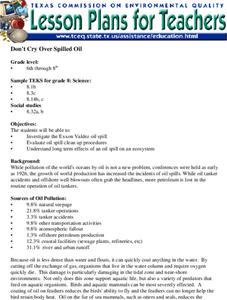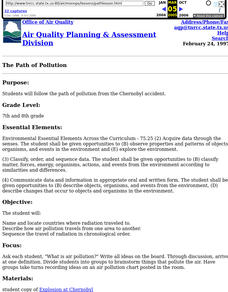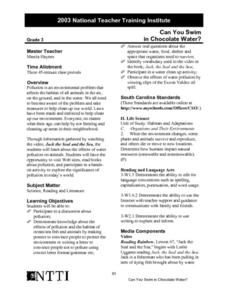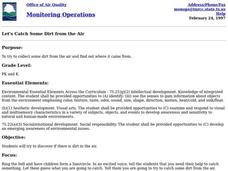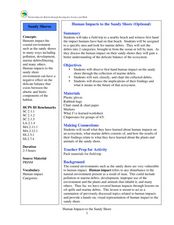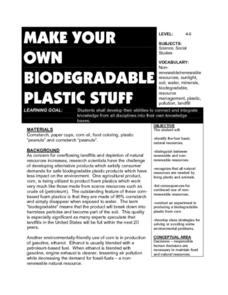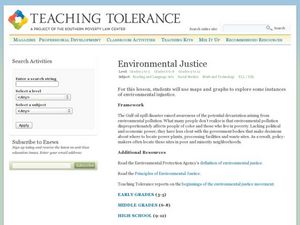California Academy of Science
Pollution in Our Watershed
The concept of a how pesticides and other chemicals pass through a watershed can be difficult for younger learners to grasp without a concrete example. In the activity here, some blank paper, markers, and a spray bottle are all you need...
Curated OER
Water filtration with Plants
Sixth graders explain how soil and plants effect contaminated water in nature. In this filtration lesson, 6th graders work in groups to test biofiltration units. Students determine which biofiltration units work best and how they...
Curated OER
Don't Cry Over Spilled Oil
Students study the Exxon Valdez Oil Spill while evaluating oil spill clean up activities. They discover the long term impact can have on an ecosystem by completing this experiment.
Curated OER
Local Environmental Issues: Pollution
Third graders discuss the ways in which human interaction with the environment and production of waste products contribute to pollution. Through a pollution demonstration, they explain how various groups of plants and animals can be...
Curated OER
The Path of Pollution
Students conduct a brainstorming exercise that asks them to list all the ideas about air pollution that can be recalled. The ideas are recorded on a chart that the teacher has prepared. The lesson contains sufficient background...
Curated OER
Air Pollution: Visible And Invisible
Fourth graders observe air pollution that is visible and invisible with experimentation. During the experiment the students collect data that needs analysis. The observations are recorded in the lab journal. The data also is represented...
Curated OER
The Path of Pollution
Students follow the path of pollution from the Chernobyl accident. Students name and locate countries where radiation traveled to, describe how air pollution travels from one area to another, and seqence the travel of radiation in...
Curated OER
Fossil Fuels: Facing the Issues
Students explore energy by researching fuel usage on Earth. In this fossil fuel lesson, students define fossil fuels, the energy created by burning them, and the impact on the environment when using them. Students conduct pollution...
Curated OER
Particle Depostition Lab
Students collect, study and observe the pollution in our air. They list three kinds of pollution that they think is in our air. Students comprehend that the atmosphere is almost completely made up of invisible gaseous substances. They...
Curated OER
Aquatic Habitat Water Quality Experiment
Fifth graders discuss the importance of water quality for humans and fish and make predictions about what happens to water that is polluted. In small groups, they conduct experiments to compare and contrast water that is unpolluted and...
Curated OER
Can You Swim in Chocolate Water?
Third graders discss water pollution and its affects on animals. They watch a demonstration using a plastic fish in a fish bowl in which various types of water pollution are illustrated.
Curated OER
Stewardship Activities
In this ocean pollution worksheet, students read the stewardship activities for ocean pollution. Students list 3 ways to help reduce pollution. Students then draw or write the items in the correct order of decomposition along the timeline.
Curated OER
Let's Catch Some Dirt From the Air
Learners investigate the dirt in the air. In this air quality lesson, students use aluminum foil and petroleum jelly to discover if there is dirt in the air. Learners discuss results.
Curated OER
Human Impacts to the Sandy Shore
Students investigate human impact on coastal environments. In this coastal environment lesson, students observe human impact on coastal environments. Students sort, classify, and chart marine debris collected on a local beach.
Curated OER
Make Your Own Biodegradable Plastic Stuff
Young scholars identify the four basic natural resources. They distinguish bettween renewable and non-renewable resources. Pupils recognize that all natural resources are needed by living plants and animals. Students list consequences...
Curated OER
What Are We?
Pupils describe different types of water pollutants. They complete experiments in which they observe the affects of water pollution on algae. They also brainstorm and list three causes of each water pollutant.
Curated OER
Particulate Matter: How Dirty is the Air We Breathe?
Fourth graders create a simple testing device and collect and observe the pollution in the air we breathe.
Curated OER
Particulate Matter: How Dirty is the Air We Breathe?
Fourth graders work together to collect air samples for testing. They determine the amount of pollution in the air in their community. They discuss their results to end the lesson.
Curated OER
How Green Are We?
Learners identify and interpret the importance of energy efficiency in connection with air pollution. They communicate with families and peers about ways to more effectively contribute to the reduction of air pollution. Finally,...
Curated OER
CO Buildup City
High schoolers conduct a controlled experiment. They collect data in an organized manner. Students analyze data to reach a conclusion and communicate findings. They explain how city size, temperature, and pollution is related to the air...
Curated OER
Let's Catch Some Dirt From the Air
Students create "catchers" that collect dirt particles from the air. They observe the particulate matter that is collected from the air and discuss the effects and causes of air pollution.
Curated OER
Environmental Justice
Students explore the concept of environmental stewardship. In this Gulf Oil Spill lesson, students discuss how environmental pollution affects those how live in poverty at a higher rate than those with more affluence. Students read...
Curated OER
Phytoremediation
Students participate in a lab designed to facilitate the clean up and remove of substances ranging from heavy metals to dynamite. They focus on the remediation of copper. They discuss their results of this open ended inquiry experiment.
Curated OER
Environment: A Day Around the Bay
Learners examine various scenarios about pollution around bays and discuss their reactions to them. Among the situations they investigate are construction site soil washing into a tributary, oil from motor boats leaking into water, and...


